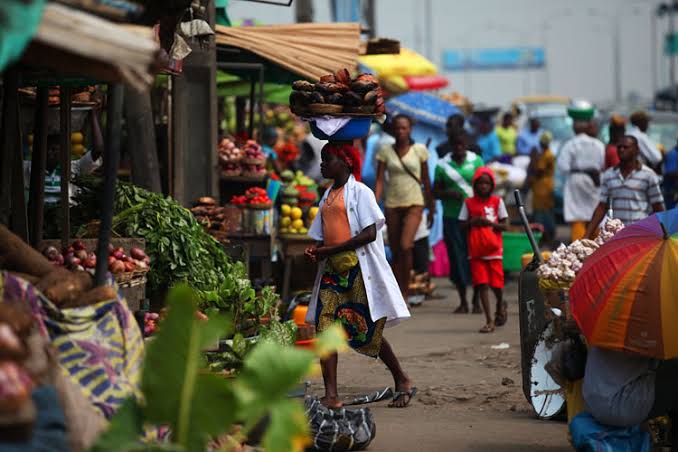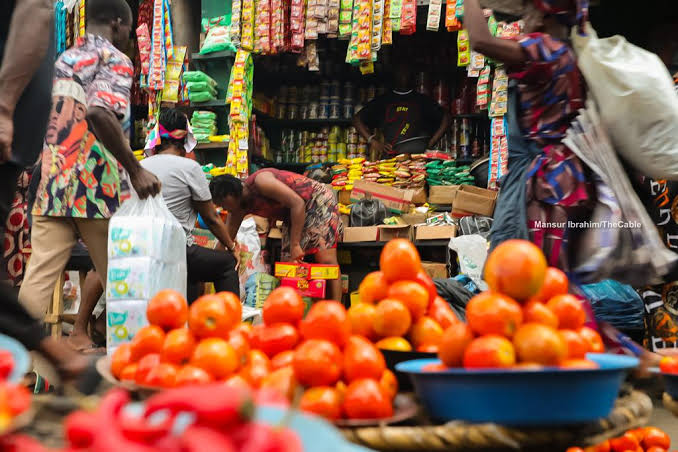Under Bola Tinubu’s administration, Christmas in 2024 for many Nigerians is less about festivity and more about survival.
Victor Temi, a teacher and father of two, once looked forward to sharing joyful moments with his family over delicious meals and thoughtful gifts. But as the year comes to a close, soaring inflation has overshadowed his plans.
Victor’s struggle mirrors the plight of millions across Nigeria grappling with rising prices and economic instability.

Basic staples, such as rice, a festive staple have doubled in price, while cooking gas now costs as much as ₦1,500 per kilogram in some areas.
These increases, coupled with stagnant wages, make it difficult for middle-income earners like Victor to maintain traditional celebrations.
“I just want my family to have a decent Christmas meal, but even that seems like a dream now,” Victor said, his voice heavy with frustration.
This year, instead of excitement, Victor finds himself calculating every naira. “Everything is so expensive now,” he lamented. “Even the staples I could afford last year have become luxury items.” To cope, Victor juggles multiple jobs, including weekend trading, but it’s still not enough.
A Bleak Market Reality
Visits to local markets reveal that essential goods and household items remain stubbornly expensive, with prices rising weekly.
Rice, beans, vegetable oil, and tomatoes, staples for many Nigerian families, are now out of reach for middle-income earners. Traders confirmed the trend to the Harbinger, lamenting how fewer customers can afford to buy in bulk.
Cooking gas, a necessity for most homes, has surged in price, with many families turning to alternatives like firewood. Public transportation costs and skyrocketing fuel prices add another layer of hardship, leaving more Nigerians trekking long distances to save money.
Salary earners and self-employed individuals alike struggle to make ends meet, their incomes barely sufficient for food, education, rent, and transportation. “Life has become unbearable,” many say, as they grapple with rising inflation during what should be a season of abundance and joy.
FCCPC’s Efforts to Address Price Hikes
The Federal Competition and Consumer Protection Commission (FCCPC) has acknowledged the financial strain on Nigerian households.
In an April 17, 2024, report, the agency outlined measures to mitigate rising prices.
While the FCCPC cannot directly regulate prices, it enforces laws against price gouging, cartel formation, and other exploitative practices.
It also monitors unusual price hikes, addresses consumer complaints, and holds businesses accountable for anti-competitive behavior.
However, these interventions offer little immediate relief to families struggling to celebrate the season.
Emotional Toll on Families
For families, the financial strain extends beyond basic needs.
Celebrations like Christmas, New Year, birthdays, weddings, and anniversaries, which once brought joy and togetherness, have been overshadowed by economic stress.
Mrs. Olowosoyo, a civil servant, reflected on the changes: “We can’t do much because of the high cost of living. Even sharing food and clothes with the needy, a Christmas tradition, is no longer possible.”
Moyin Olowosoyo, another salary earner, described the impact on her household: “₦20,000 barely covers a pot of soup for two days, and a monthly salary of ₦50,000 is now worth nothing. We need at least ₦150,000 monthly, which is unrealistic for most earners.”
READ MORE: https://parallelfactsnews.com/reno-omokri-bayo-onanuga-for-apc-slave-award/
Christmas Amid Challenges
The festive season, a time traditionally associated with love, generosity, and community, now feels distant for many families.
In a report by the Nigerian Tribune on December 22, 2024, Chukwuma Obi, a father of four in Oyingbo Market, Lagos, shared his plight.
“Last year, I couldn’t afford to buy a bag of rice and live chicken for my family. Now, I can barely afford half of what I used to buy,” he lamented, adding that he has canceled his plans to visit his hometown in Owerri, Imo State, for yet another year.
Students Are Not Exempted From These Struggles
Segun-Odidi Yoyinsola, a student at Lagos State University, recounted how her mother, once committed to extravagant festive preparations, has scaled back due to rising prices.
“Every Christmas, my mum made sure to cook a lot of food, bake snacks, and buy new clothes,” Yoyinsola said. “But Christmas in 2024 is totally different. Every day comes with new lamentations.”
Similarly, Ojo Emmanuel Oluwadarasimia, a 100-level student at Obafemi Awolowo University (OAU), described the toll on his family: “Things are so costly. There’s no money in circulation to buy anything. I’ve cut my daily spending from ₦2,000 to ₦200.”
Oluwadarasimi invoked the Latin phrase Nemo dat quod non habet, “You can’t give what you don’t have” to emphasize the harsh realities families face. Parents, as primary earners, are increasingly unable to meet even basic needs, leaving little room for celebrations.
Follow the Parallel Facts channel on WhatsApp: https://whatsapp.com/channel/0029VaCQSAoHgZWiDjR3Kn2E









Leave a Reply